Wildlife Crime And Punishment: Equipping The Enforcers And Interpreters Of Law
First published in Sanctuary Asia,
Vol. 43
No. 4,
April 2023
By Purva Variyar
The journey of a wildlife crime, from its undertaking to its adjudication in the court of law, is a complex affair fraught with umpteen challenges for law enforcement agencies in their struggle to prove the crime in a courtroom and receive just conviction. This journey is riddled with systemic gaps that run deep. Crimes against wildlife are rampant and thriving in India. Hunting protected species for subsistence, traditional medicine, religious practices, and wildlife trafficking; illegal entry into Protected Areas and their destruction and more pose serious threats to India’s wildlife populations and habitats, which are already being dealt severe blows by various other anthropogenic pressures. And sadly, the conviction rate of wildlife crime cases in India is less than five per cent.
Fortunately, legislation in India provides an extensive framework to protect wildlife and its habitat, and the environment. But laws robust only in theory are toothless.
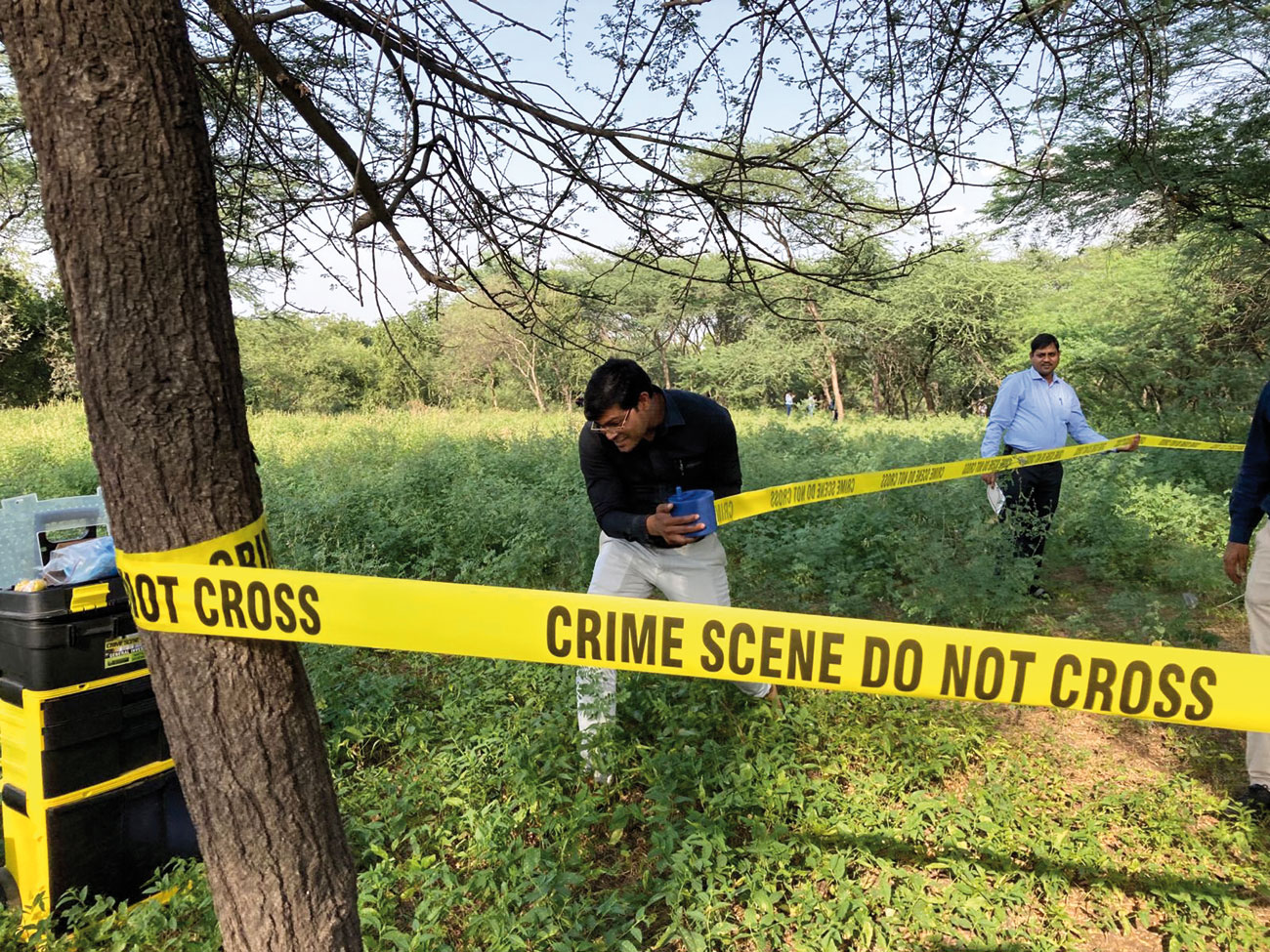
Forest officers of the Madhya Pradesh Forest Department engage in a mock crime scene to practice investigation skills during a special Forensics Training programme organised by WCT at the National Forensic Science University, Gandhinagar, in October 2021. Photo: C. Samyukta/WCT.
“The provisions of the Wild Life (Protection) Act, 1972, (here on referred to as the Act), are protectionist in approach and prescribe a variety of prohibitions that can be interpreted widely. The Act is among the strongest legal frameworks for protecting wildlife in the world. While enforcement finds invoking the right sections and producing immaculate paperwork tricky, creatively applying the law to the facts of a case can strengthen cases and improve conviction rates. It is up to prosecutors and lawyers to assist forest officers to ensure that this happens,” says Mridula Vijairaghavan, Environmental Lawyer with the Wildlife Conservation Trust (WCT).
Mridula, along with members of WCT’s Combatting Wildlife Crime (CWC) Programme team, is bridging the gap when it comes to knowledge and capacity of the forest staff as well as prosecutors and judges with respect to wildlife protection laws in India. WCT’s CWC Programme, supported by DSP Investment Managers, works with varied stakeholders including state forest departments, judiciary and public prosecutors to improve detection, prosecution and conviction of wildlife crimes.
Justice can only be achieved when all the cogs of the wildlife law and enforcement wheel are in sync. A very important cog is the judiciary, alongside law enforcement officers and policymakers.
Through its CWC Programme, WCT is not only training and building capacity of various state forest departments in wildlife law enforcement and crime scene investigation, but is also working to systematically sensitise and create increased awareness through specialised workshops for various levels of the judiciary.
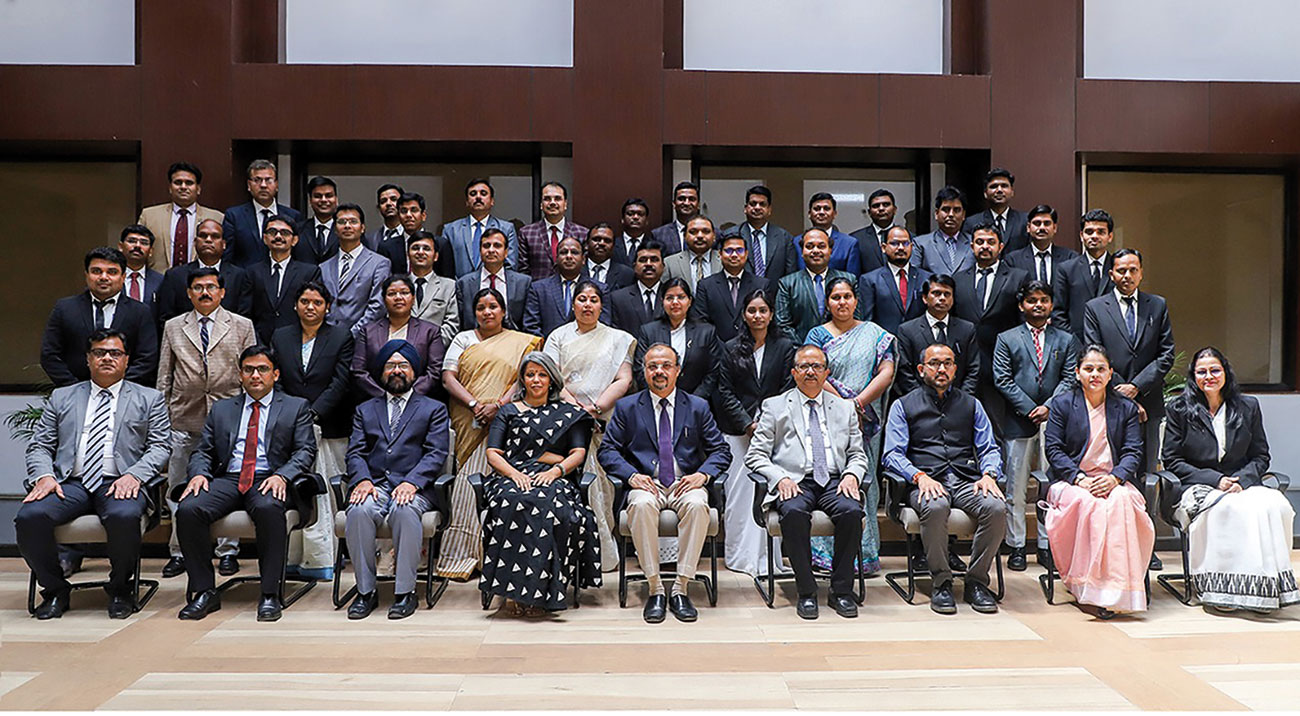
WCT’s Forensics expert, C. Samyukta (front row, fourth from left), with the participating senior judiciary members and lawyers at the symposium held by WCT at the Madhya Pradesh State Judicial Academy, Jabalpur, in 2022. Photo: MPSJA.
Sensitising The Judiciary
It is make or break in a courtroom. So much rests on the presiding judge’s sound judgement, knowledge, fairness, and powers of interpretation of both, the provisions of the law as well as evidence. It falls upon the prosecutors to articulate evidence and testimony, and build watertight cases that can withstand scrutiny in the court of law. It is critically important then, that lawyers and presiding judges have an optimal grasp of the complex issues regarding wildlife.
“Cases of wildlife crime are tried before magistrates who adjudicate a range of cases from murder and rape to narcotics and negligence. They deal with a massive number of legislations on a daily basis, making it hard to pay particular attention to a special Act like the Wild Life (Protection) Act, 1972. Judges may not be immediately familiar with it, or the context in which it operates. Therefore, sensitising the judiciary about the nuances and intricacies of the Act, and, more importantly, to the plight of wildlife and the heavy costs of wildlife trade can go a long way in having a more aware judge presiding over the case. Several trial court judgments now take a compassionate view towards wildlife and emphatically state this in their judgments, indicating that sensitisation programmes for the judiciary play a significant role in the fight against wildlife crime,” explains Mridula.
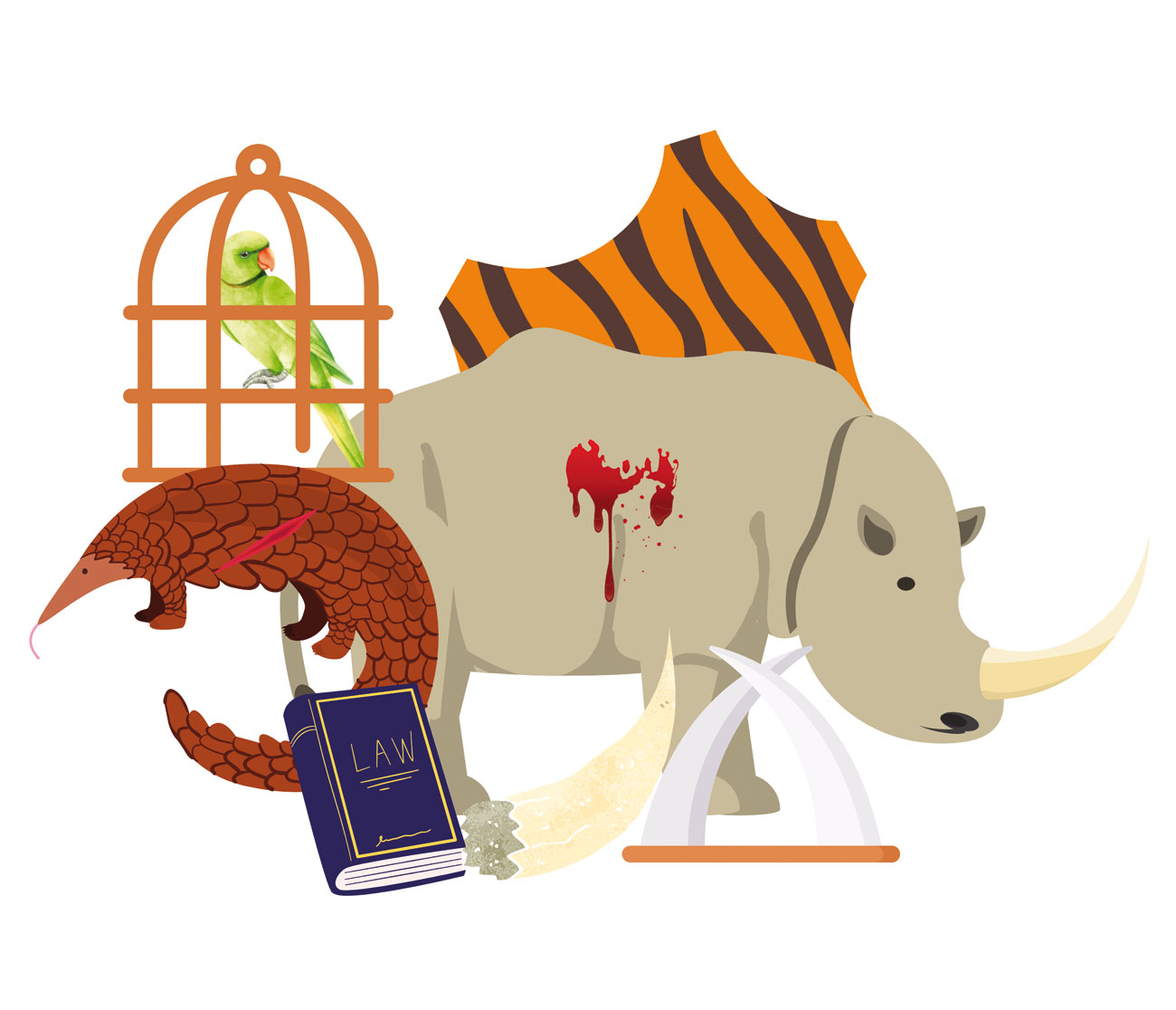
Photo: Purva Variyar/WCT.
The training programmes for judges and prosecutors are intensive and are conducted by WCT’s team of law and forensics experts in collaboration with the forest department and institutions such as the Madhya Pradesh State Judicial Academy. WCT is also using such workshops as opportunities to bring two important stakeholders involved in the prosecution of wildlife crime together in the same room – forest officers and prosecutors.
In February 2023, in collaboration with the Madhya Pradesh Forest Department, WCT hosted a two-day workshop for 20 Additional District Prosecution Officers (ADPOs) from 18 districts of Madhya Pradesh at the Van Vihar National Park, Bhopal. The workshop focused on challenges in the implementation of the Act and the procedural hindrances faced by forest staff while prosecuting wildlife crimes. Various senior officers from the Madhya Pradesh Forest Department interacted with the attending prosecutors.
“Where their [forest officers’] investigation ends, our work begins. Wildlife crimes are on the rise, and such workshops by WCT are helping prosecutors like me to better understand the challenges and shortcomings of the forest staff, provisions of the Act, and the multi-faceted nature of wildlife crime. Poor interpretation of sections of the Act, shoddy handling and processing of evidence as well as weak crime scene investigation skills often result in poorly drafted Preliminary Offence Reports (POR) and weak case papers. Ultimately, such wildlife crime cases do not stand a chance at obtaining rightful convictions, thereby letting offenders go scot-free,” says Neeraj Pandey, ADPO, Rewa, Madhya Pradesh, who participated in the Bhopal workshop.
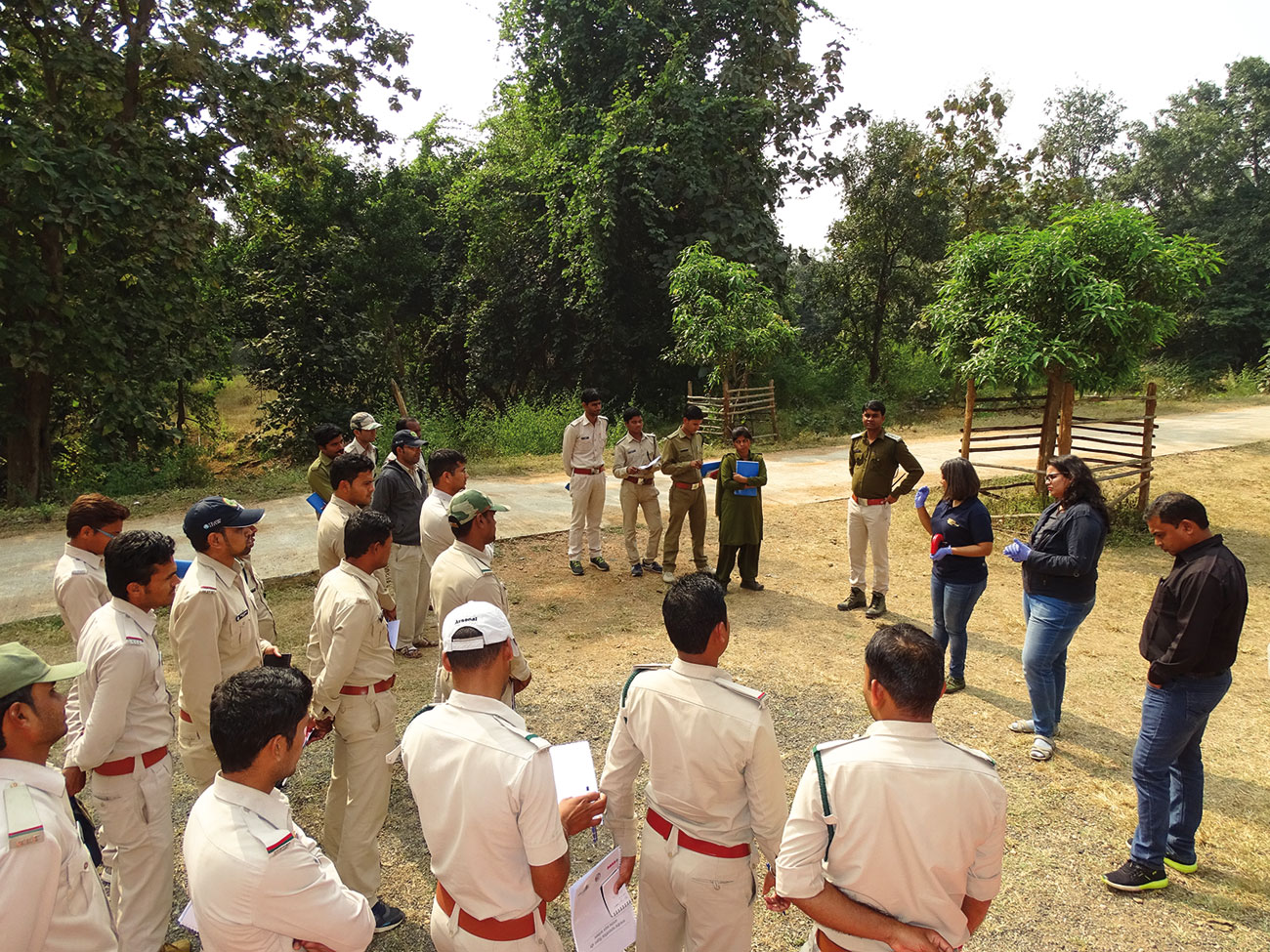
WCT’s law and forensics experts train a batch of frontline forest staff. Photo: WCT.
Equipping The Forest Staff
Do you see much of a difference between the terms ‘wild animal’ and ‘wild life’? Or ‘animal’ and ‘captive animal’? Or ‘meat’, ‘trophy’ and ‘animal article’? On legal paperwork being presented to the court as evidence by a forest officer, the difference is stark and even a single out-of-place term could potentially weaken a case. In the court of law, a case hinges on the accuracy of terminology and interpretation of provisions of the Act.
“Intention is the backbone of any crime, including crimes against wildlife. Proving the intention behind offence/s committed, suspected or otherwise, beyond reasonable doubt in the court of law is the be-all and end-all of prosecution,” says Mridula. Hence, it is important for forest officers to ensure that the offender is charged under the correct sections of the Act.
“Sometimes, based on available evidence and circumstances, say in a case involving hunting, it is easier to prove an accompanying offence, such as illegal possession or illegal entry into a sanctuary with weapons instead of hunting itself, and invoking allied sections of the Act is a smarter way of making the charges stick. This requires in-depth understanding of the Act and the nature of wildlife crimes, and this is what we are trying to inculcate within the forest staff, lawyers and senior members of the judiciary,” explains C. Samyukta, Forensics Expert, WCT.
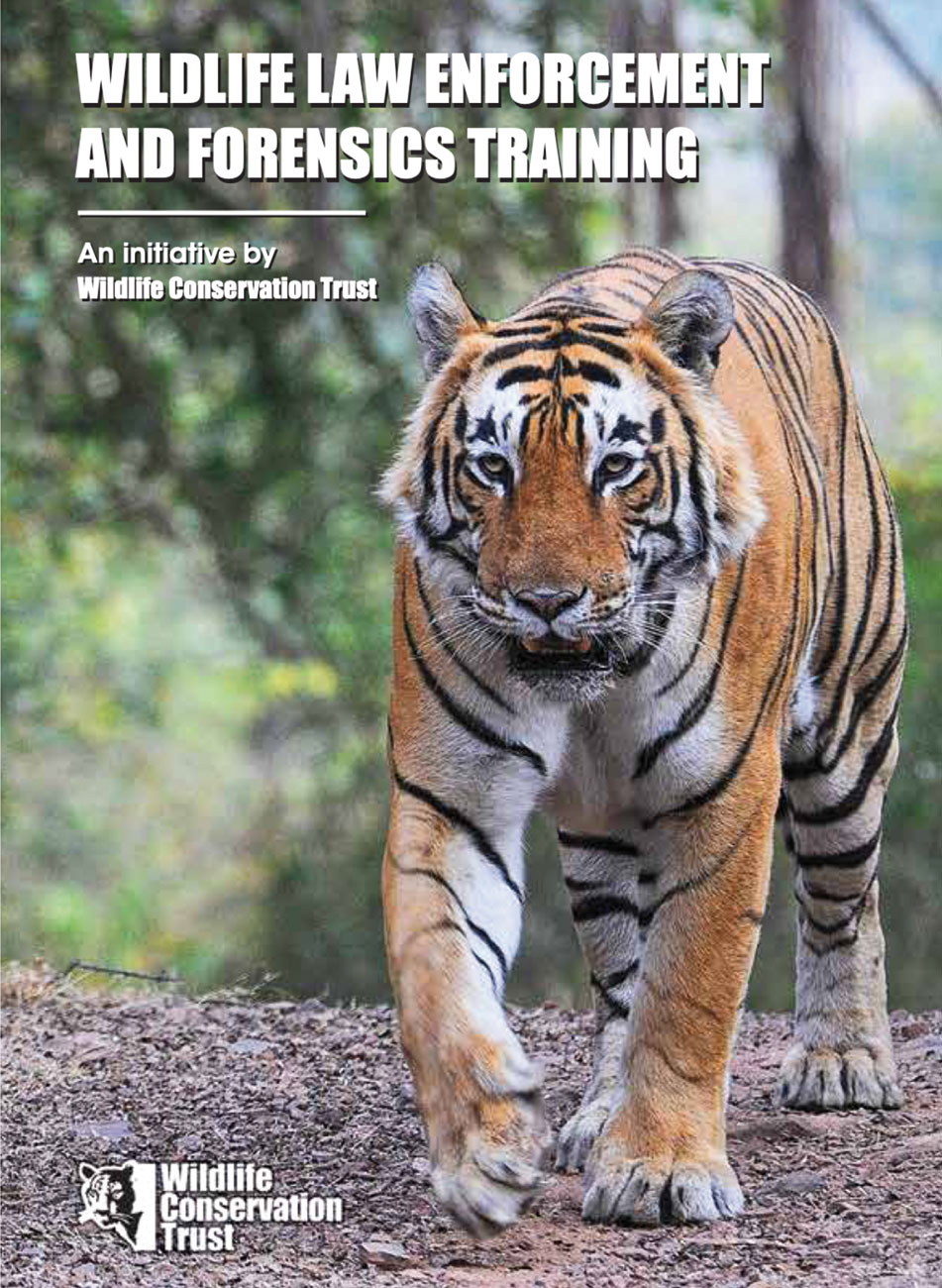
Wildlife Law Enforcement and Forensics Training Manual produced by WCT.
WCT is equipping the forest staff with knowledge of the Act, and improved understanding of the powers vested in them under the Act. The aim is to strengthen the enforcement capacity within the state forest departments. More than 15,500 forest guards across 40 Protected Areas in India have benefitted from WCT’s law enforcement training and forensics workshops so far. Regular Wildlife Law Enforcement and Forensics training programmes for the frontline forest staff, senior forest officers, division-level forest officers and also trainees at the Forest Training Institutes in Maharashtra and Madhya Pradesh are conducted by WCT in collaboration with state forest departments.
But, apart from training the forest staff, WCT is now on a mission to build a solid network of lawyers across India who are motivated to volunteer their time to assist forest staff by providing legal advice and inputs on paperwork. This will help to build stronger cases and augment the efforts of forest staff and contribute to the fight against wildlife crime.
“As lawyers may not be immediately familiar with the nitty-gritties of the Wild Life (Protection) Act, 1972 and allied laws, WCT is working towards conducting workshops for practicing lawyers who are interested in volunteering their time with the forest staff and prosecutors on wildlife crime cases,” says Mridula.
In February 2023, in collaboration with the School of Law, Christ University, Bengaluru, WCT organised an intensive workshop, which was attended by 17 practicing lawyers from across India who were shortlisted from among many applications, and 29 law students from Christ University. This initiative has received rave responses from the legal community, with many of them willing to lend their expertise for the good of wildlife.
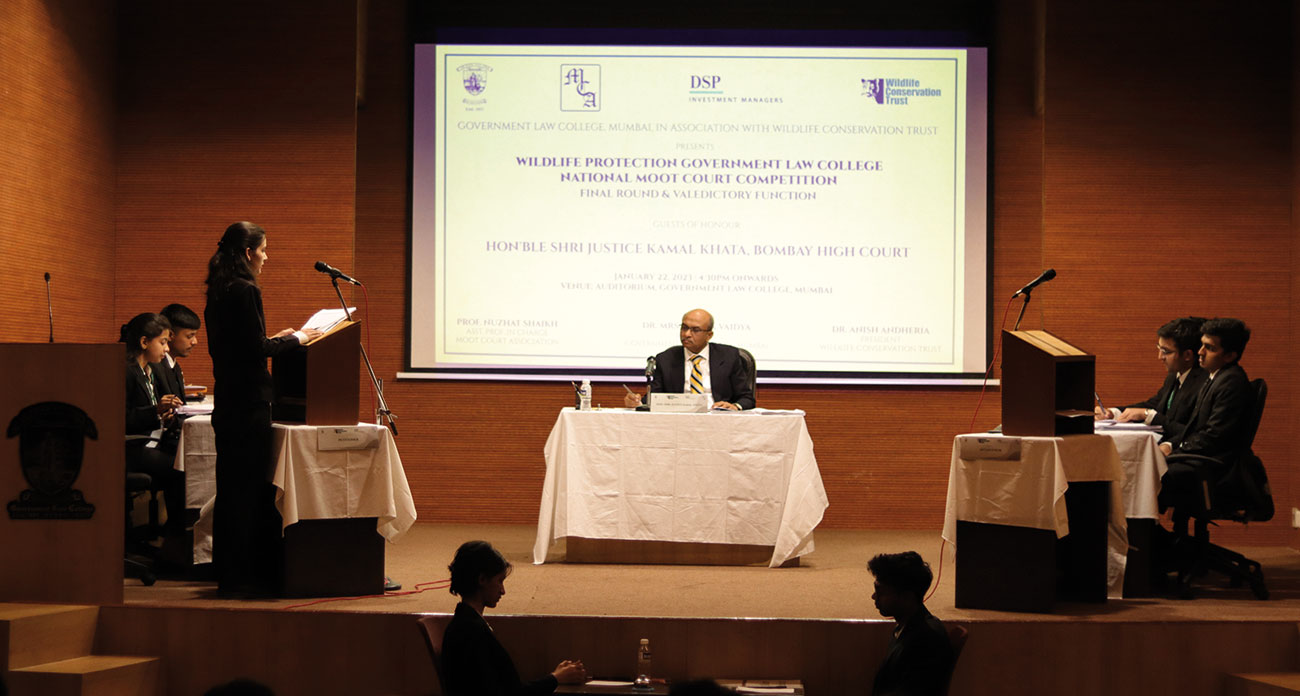
Hon’ble Justice Kamal Khata, Bombay High Court (middle), presiding over the final round of the 4th Wildlife Protection Government Law College National Moot Court Competition, held on January 22, 2023, at the Government Law College auditorium. Photo: WCT.
Catching Them Young
India desperately needs an army of dedicated and trained environmental lawyers who are well-versed with the plethora of environment, climate and conservation-related issues that plague our country.
“Courtrooms across India are overburdened with cases of crime against humans. As a result, cases filed against hunters, polluters, illegal wildlife traders, and animal cruelty incidents are lost in the clutter. A sharp legal mind is needed to bring judges’ attention and justice to these environmental, wildlife, and animal rights ‘underdogs’. When combined with a judiciary that has been sensitised and trained in wildlife law, such legal acumen will ensure that strong sentencing of wildlife criminals becomes the norm rather than the exception,” says Samyukta.
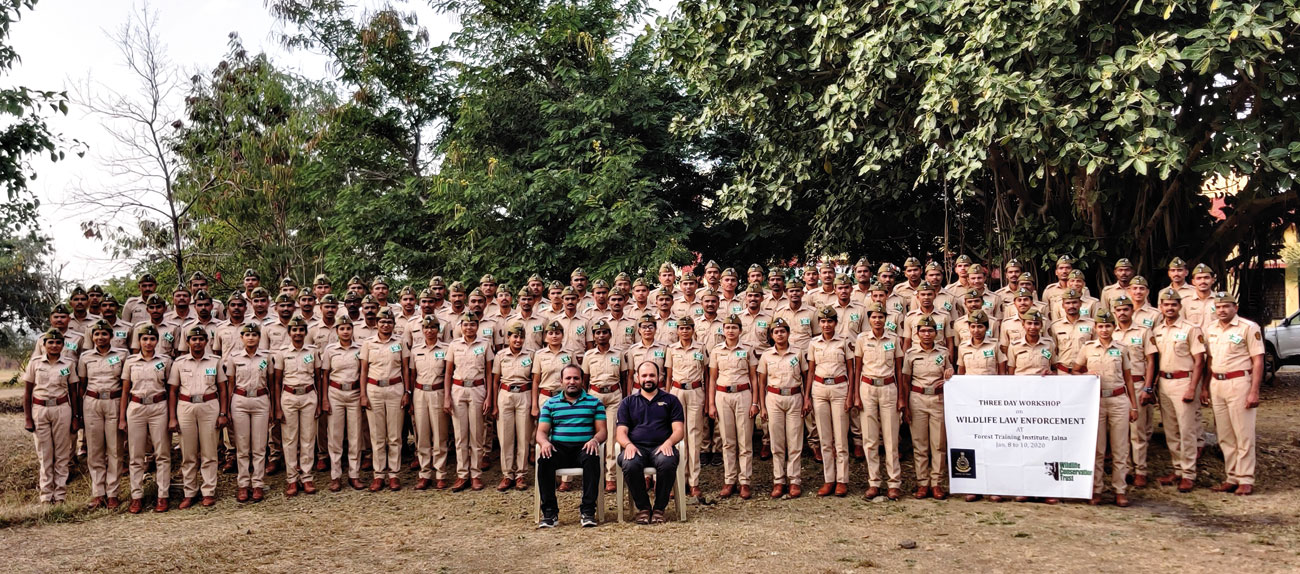
The 2020 batch of trainees at the Forest Training Institute, Jalna, with WCT’s Law Enforcement experts during a three-day workshop. Photo: WCT.
While working with established law professionals is necessary, it is equally important to catch them young. Building interest around environmental education and wildlife conservation among young law students will prove fruitful in the long run. And to this end, WCT’s unique wildlife protection-themed National Moot Court Competition in collaboration with Mumbai’s Government Law College is a promising endeavour. Already four editions old, this DSP Investment Managers-funded competition sees law students from around 16 prestigious law colleges across India participating annually.
This event is helping participating law students get a serious understanding of the challenges of wildlife conservation and environment. The reading and preparations they have to undertake to deliberate on the carefully curated moot problems that are built around real, pressing and current wildlife issues makes them more conversant with these otherwise neglected matters. The format of the competition pits them against each other in legal arenas that are presided over by some of the most accomplished judges from the Bombay High Court.
“In the long-term, the event hopes to build a pool of bright legal minds for combatting wildlife and forest crime issues,” Samyukta adds.
Purva Variyar is a Conservation and Science Writer with the Wildlife Conservation Trust. She has previously worked with Sanctuary Asia magazine and with the Gerry Martin Project.








